Barrow Gang
The Barrow Gang was an American gang active between 1932 and 1934. They were well known outlaws, robbers, murderers and criminals who as a gang traveled the Central United States during the Great Depression. Their exploits were known all over the nation. They captured the attention of the American press and its readership during what is sometimes referred to as the 'public enemy era'. Though the gang was notorious for the bank robberies they committed, they preferred to rob small stores or gas stations over banks. The gang was believed to have killed at least nine police officers, among several other murders.
The gang was best known for two of its members, Bonnie Parker and Clyde Barrow, an unmarried couple. Clyde Barrow was the leader. Other members included:
- Clyde's older brother Marvin "Buck" Barrow
- Buck Barrow's wife Blanche Barrow
- W. D. Jones
- Henry Methvin
- Raymond Hamilton
- Joe Palmer
- Ralph Fults
- S J Whatley
Gallery
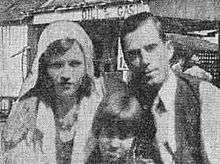 Blanche and Buck Barrow 1931
Blanche and Buck Barrow 1931 July 27, 1933 – Blanche Barrow
July 27, 1933 – Blanche Barrow Clyde Barrow age 17 in 1926 mugshot
Clyde Barrow age 17 in 1926 mugshot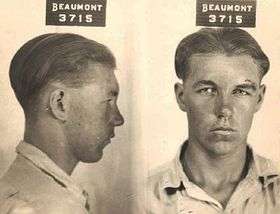 22 October 1931 William Daniel Jones, 15, and friend LC Barrow were arrested after disappearing with, then wrecking, a bootlegger's car.[1]
22 October 1931 William Daniel Jones, 15, and friend LC Barrow were arrested after disappearing with, then wrecking, a bootlegger's car.[1]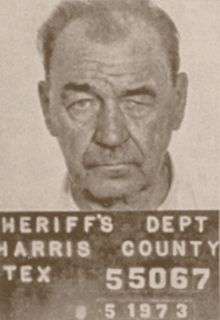 W. D. "Deacon" Jones in 1973
W. D. "Deacon" Jones in 1973 Mug shot of Henry Methvin from December 1931, age 20
Mug shot of Henry Methvin from December 1931, age 20
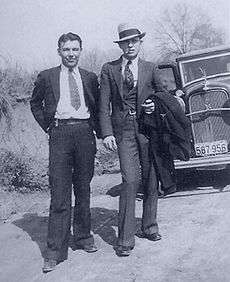 Barrow, Parker and Jones paused on a disused road to take pictures of themselves in the late winter or early spring of 1933.
Barrow, Parker and Jones paused on a disused road to take pictures of themselves in the late winter or early spring of 1933.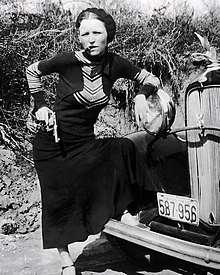 Parker's playful pose with a cigar brands her in the press as a "cigar-smoking gun moll" when police find the undeveloped film in the Joplin hideout
Parker's playful pose with a cigar brands her in the press as a "cigar-smoking gun moll" when police find the undeveloped film in the Joplin hideout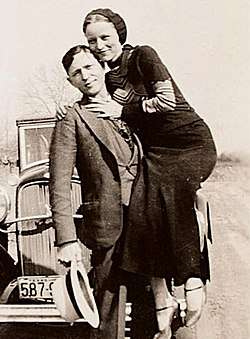
Clyde Barrow and Bonnie Parker—picture found by Joplin Missouri Police 
Bonnie with a shotgun reaches for officer Persell's pistol in Clyde's waistband.[2] 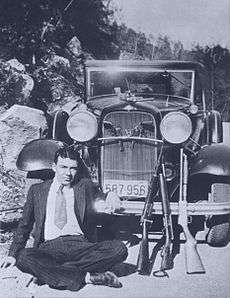
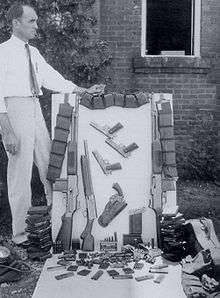 Over a dozen guns and several thousand rounds of ammunition (including 100 20-round BAR magazines) were in the perforated Ford after deaths of Bonnie and Clyde.
Over a dozen guns and several thousand rounds of ammunition (including 100 20-round BAR magazines) were in the perforated Ford after deaths of Bonnie and Clyde.
See also
References
- Beaumont, Texas mugshot. FBI file 26-4114 Section Sub A pp. 54-55. "The car we had torn up belonged to a bootlegger who had hired us to deliver his liquor. We got to pulling on a bottle and just hooked 'em with the liquor and the bootlegger's car." "Riding with Bonnie and Clyde."
- [See succeeding footnote]
- "It had a one-inch rubber band he'd cut out of a car-tire inner tube attached to the cutoff stock. He'd slip his arm through the band and when he put his coat on, you'd never know the gun was there. The rubber band would give when he snatched it up to fire." "Riding with Bonnie and Clyde."
- Persell had watched their car slowly cruising the downtown area and suspected an imminent car theft. He stopped them on a bridge, which made Barrow suspect that more police were lying in wait on the other side. They released him unharmed six hours later and fifty miles away, but kept his Russian-made, custom-grip gun, which was next seen in the roll of photographs recovered at Joplin, in one picture hooked over the hood ornament of their latest stolen V-8, in another tucked into Barrow's waistband as Parker holds a shotgun on him and reaches to take it. "Riding with Bonnie and Clyde"; Guinn pp.157-59; O'Brien, Mike. "Book follows bloody trail of Bonnie, Clyde across Ozarks," Springfield News-Leader, January 4, 2004. The photographs: Ramsey pp. 108-13. Persell moved on with his life and never spoke much about the incident, though it came up again decades later, when he let his granddaughters bring him to school for show and tell. "Bank Robbers Bonnie, Clyde Kidnapped Policeman in 1933." Rootsweb: Local History. Originally published in the Springfield Leader-Press, Oct. 10, 1999.